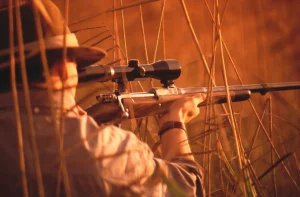Unauthorized Possession of a Firearm in Ontario
Summary Conviction Defence, Under Section 91 of the Criminal Code
Understanding Firearm Offences and How to Defend Yourself
Firearms charges in Ontario are extremely serious. One of the most common charges people face is unauthorized possession of a

firearm. Being accused of this crime can lead to devastating consequences, even if you never intended to break the law.
Knowing your rights, responsibilities, and possible defences is crucial if you are charged.
At Cambium Legal Services, we help individuals across Southern Ontario understand and fight unauthorized possession charges. In this article, we will explore the offence, the law, penalties, common defences, and what steps you should take immediately if charged.
What is Unauthorized Possession of a
Firearm?
Unauthorized possession of a firearm occurs when someone has a firearm — whether prohibited, restricted, or non-restricted — without the proper licence and, if required, a registration certificate.
Under section 91(1) of the Criminal Code, a person commits this offence if they possess a firearm without:
-
A valid firearms licence; and
-
A registration certificate (for restricted or prohibited firearms).
Additionally, under section 91(2), unauthorized possession also applies to restricted weapons, prohibited weapons, prohibited devices (like silencers), or prohibited ammunition.
Key takeaway: If you possess a firearm, weapon, or device without proper documentation, you could face serious criminal charges in Ontario.
Penalties for Unauthorized Possession of a Firearm
The penalties for unauthorized possession of a firearm can be life-altering. If you are convicted, you could face:
-
Up to five years in prison if the Crown proceeds by indictment;
-
A summary conviction option, which carries lower penalties but still results in a criminal record.
The Crown prosecutor decides how they wish to proceed. However, even a summary conviction can have major effects on your life, including employment challenges, travel restrictions, and loss of firearm privileges.
Moreover, courts take firearms offences very seriously. Even first-time offenders often face jail time unless strong mitigating factors exist.
When is Unauthorized Possession Not a Crime?
Interestingly, there are exceptions written into the law. Section 91(4) outlines two major exceptions:
-
Supervised possession:
If you are under the direct and immediate supervision of someone legally authorized to possess the firearm, you may legally handle it. This situation often arises at shooting ranges or during supervised instruction. -
Operation of law:
If you come into possession of a firearm, weapon, or prohibited device by operation of law — for example, inheriting a firearm — you are not guilty if you take reasonable steps to either lawfully dispose of it or obtain the proper licensing within a reasonable time.
Failure to act promptly, however, could still result in charges.
Act Quickly if Charged
Facing a firearms charge is terrifying, but immediate action can make a significant difference in your outcome. Here are the critical first steps:
-
Do not speak to police without legal advice.
Exercise your right to silence respectfully. Anything you say can be used against you. -
Contact a licensed legal representative immediately.
At Cambium Legal Services, we specialize in helping individuals fight firearms charges in Southern Ontario. -
Document everything.
Write down details of your arrest, what officers said or did, and any relevant background about the firearm. -
Secure evidence.
If you have proof of efforts to comply with firearms laws — such as an expired licence you were renewing — gather these documents quickly.
Transitioning quickly to legal support helps preserve your strongest possible defence.
Common Defences to Unauthorized Possession Charges
Several potential defences exist for an unauthorized possession of a firearm charge, depending on your circumstances:
📍 Lack of Knowledge
If you did not know that you were in possession of the firearm, you may have a valid defence. For instance, if you borrowed a backpack and unknowingly carried a gun inside, lack of knowledge could be raised.
📍 Lawful Supervision
If you were handling the firearm under the immediate supervision of a licensed individual, your possession may not have been unlawful.
📍 Reasonable Steps After Inheritance
If you inherited a firearm, and are in unauthorized possession of a firearm, and took steps to either get licensed or dispose of it promptly, this may provide a complete defence.
📍 Charter Violations
If your Charter rights were violated during search or arrest — for example, if police conducted an illegal search — evidence may be excluded.
📍 Mistake of Fact
Mistakes about licensing or registration status, if reasonable and genuine, may help establish that you did not knowingly commit an offence.
Why Courts Treat Unauthorized Firearm Possession So Seriously
Canadian courts, especially in Ontario, view unauthorized possession of a firearm as a threat to public safety. The fear is that unauthorized possession of a firearm may lead to accidental discharges, misuse, or criminal activity.
Even in cases where the accused had no malicious intent, courts emphasize:
-
The importance of regulating firearms strictly;
-
The need to maintain community safety;
-
Deterrence of careless behaviour.
Thus, presenting mitigating factors — such as character references, rehabilitation efforts, or evidence of prior compliance — becomes vital during sentencing.
Recent Case Law: Unauthorized Possession in Ontario
Several Ontario decisions highlight how courts approach unauthorized possession:
R. v. Chahal, 2019 ONCA 451
In this case, the Ontario Court of Appeal confirmed that possession includes situations where a person has knowledge and control over a firearm, even if it is not on their immediate person.
R. v. Driscoll, 2015 ONCA 771
The court ruled that ignorance of licensing requirements was not a full defence but could impact sentencing.
These cases show that prosecutors do not need to prove intent to misuse the firearm — simple possession without authorization is enough.
Sentencing Factors: What Influences Your Outcome?
Sentencing is never automatic. Courts consider various factors, including:
-
The type of firearm or device involved;
-
The circumstances of possession (public vs private location);
-
Any past criminal record;
-
Whether the firearm was loaded;
-
Presence of ammunition nearby;
-
The accused’s cooperation with authorities.
Strong legal advocacy can highlight mitigating factors that reduce penalties.
What Happens to Your Firearms Licence After a Conviction?
If you are convicted of unauthorized possession of a firearm, you face:
-
Immediate revocation of your firearms licence;
-
A mandatory firearms prohibition order, usually for 10 years or for life depending on your history.
Even if you regain eligibility later, reapplying for a licence will be extremely difficult after a conviction.
Why Hiring an Experienced Representative Matters
Because unauthorized possession carries heavy penalties, having an experienced representative can make the difference between a criminal record and an acquittal.
At Cambium Legal Services, we:
-
Thoroughly review your case for legal errors;
-
Challenge unlawful police conduct;
-
Advocate for alternative outcomes like diversions, discharges, or reductions;
-
Prepare for trial when necessary.
We understand the unique challenges that firearms cases present and work tirelessly for every client.
🔹 Contact Cambium Legal Services Today
If you have been charged with unauthorized possession of a firearm in Southern Ontario, time is not on your side. Early legal advice can help protect your rights, your freedom, and your future.
📞 Call Cambium Legal Services today at (833) 222-6529 for a free, confidential consultation.
Don’t face these serious charges alone — let us fight for you.
Related posts:
How can we keep the government we create from becoming a Frankenstein that will destroy the very freedom we establish it to protect? Freedom is a rare and delicate plant.
Milton Friedman, Capitalism and Freedom (1962), Introduction

